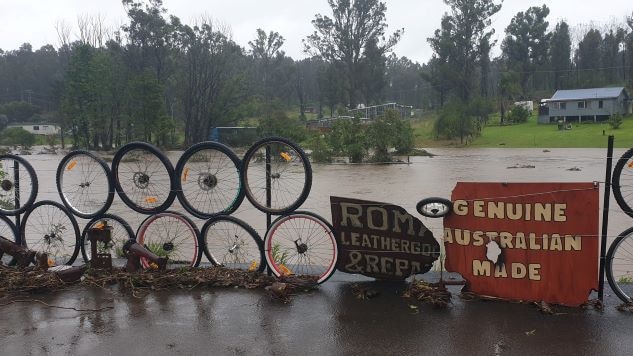Black Summer bushfires: Picture special reveals devastation
On the two year anniversary of the Black Summer bushfires, heartbreaking new aerial photos reveal the utter devastation as those on the frontline remember the day the fires came.
NSW
Don't miss out on the headlines from NSW. Followed categories will be added to My News.
Almost two years to the day the Black Summer bushfires neared their deadly peak.
Much of the south coast of NSW was ablaze and it would continue for weeks.
Hundreds of kilometres away thick acrid smoke filled the air.
But that was nothing compared to the hellish flames, whipped up by powerful gusts, on the frontline.
Since then we’ve had floods and, of course, Covid. But for most of us the Black Summer bushfires are now a historic event, a thing of the past.
The same cannot be said for those who live in the towns and communities hit the hardest.
Two years on they are still living with it every day.
They are living with the impacts: both economical, mental and even physical.
In an extraordinary set of photographs, aerial imagery company Nearmap has studied the resilience of the land from above.
They sent up aircraft shortly after the bushfires and then several months later.
As well as Batlow, Lake Conjola, Rosedale and Mogo in NSW, they captured images from Kangaroo Valley in SA, Buchan and Mallacoota in Victoria and Marmaryee in Queensland.
Within months charred fields and forests are green again, tracks have been cleared and crops regrown.
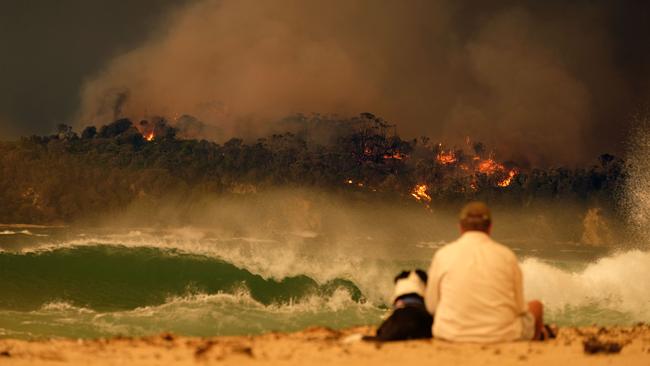
But the images also give an indication of the heartbreaking situation for many. Pictures of houses reduced to rubble have become overgrown plots, abandoned due to economic hardship. And not all arable land has bounced back as quickly with some images of farms almost identical from shortly after the fires.
For Matt Rudd, publican of the Batlow Hotel, life has never been the same since.
Four years ago Matt and his wife Linda left Sydney after falling in love with the small town.
When the fires hit they were among the “lucky” ones.
“We lost 23 homes, just in the actual town itself,” Matt said.
Matt managed to stay and defend the hotel from the flames, describing the experience as “too busy to be traumatic”.
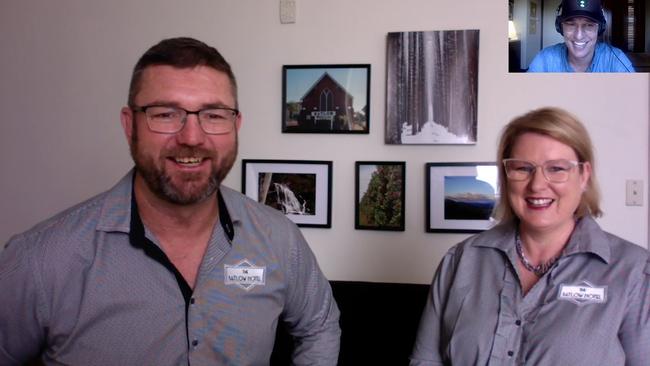
He added: “I was just in survival mode.”
He said many of his fellow residents who lost homes haven’t been able to rebuild and have sold their land – or what was left of it – and moved on.
He fears Batlow will never be the same.
“The fires have put a huge dint in everything because of the devastation to the industries around here,” he said.
There are two main industries in Batlow – forestry and apples.
“The forestry industry is 25 to 30 years off recovery – they lost, I think, 90 per cent of their trees.
“The government has given grants to the farmers in relation to replanting and stocking their orchids – I think it’s something like 100,000 new trees have been planted in the last 12 months alone.”
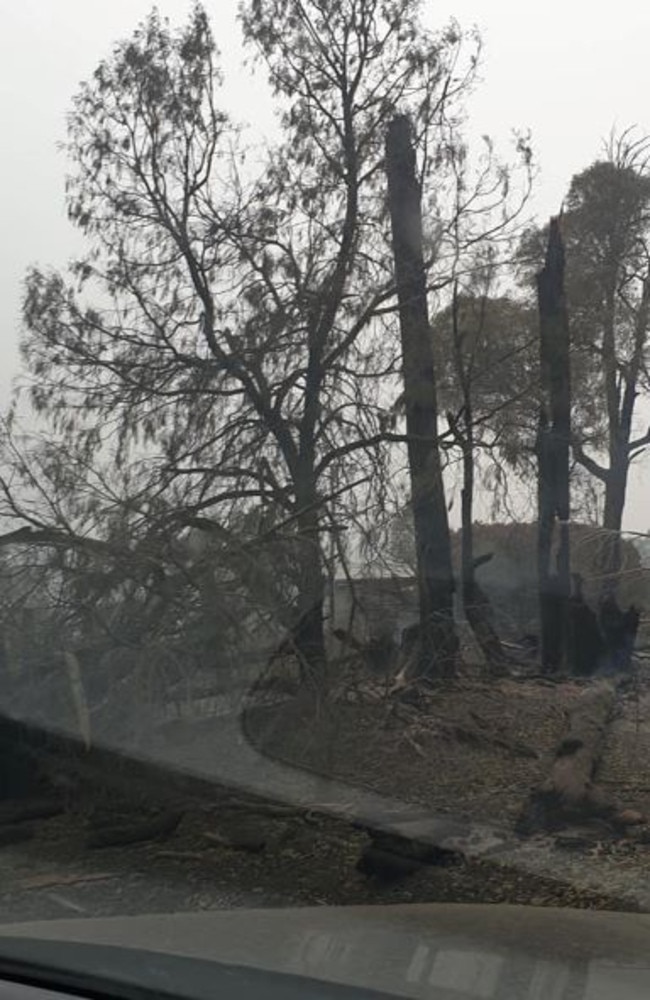
But for Matt, a small-business owner, the recovery from the fires was only made more difficult by Covid.
“We were just starting to get on top of things after the bushfires, just starting to get some business back, and then Covid hit,” he said.
Even though last year’s colder weather created a fantastic season for apples, Covid meant the usual demand for Batlow apples wasn’t there.
“It’s great to have all the apples grown, but when you can’t sell them, it just makes it harder for the farmers,” he said.
“Covid really just sealed the deal, I suppose, on how bad things have been.
“What we all really need is for people to come and visit Batlow — that’s what will help bring this town back.”
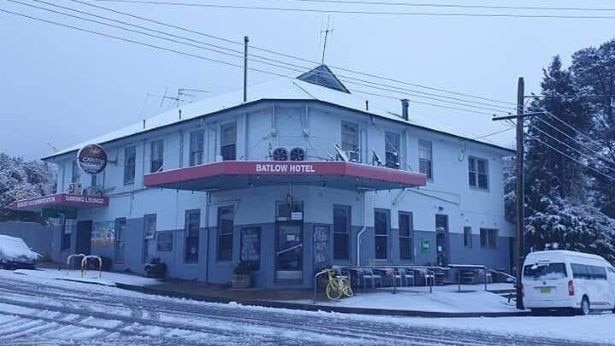
Down in Rosedale, south of Batemans Bay, residents sought refuge on the beach as the flames cut them off.
Mark Gibson’s family holiday house, nicknamed “Banksia”, was on a pocket of land off George Bass Drive, just north of Rosedale Beach.
For more than 50 years, the Gibsons have been spending their family holidays at Banksia.
In the late 1950s, Mark’s grandparents (Quentin and Joyce Gibson) built their family’s holiday house from scratch, with the vision of one day passing it down to their grandchildren.
When Mark was spending his annual family summer holiday there, none of them expected the fires to cause the devastation they did.
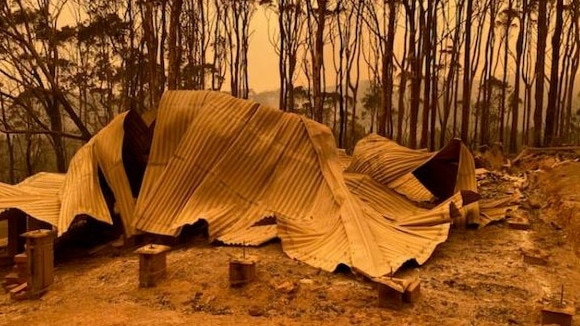
It was only when they received a message alerting them to a fire around Mogo they decided to evacuate to the surf club.
“It was one of those things where you keep on telling yourself that it’s just precautionary,” Mark recalled.
“It seemed like a hot day with a bit of a wind but nothing like I remember experiencing when I was in Victoria during the Black Saturday fires – and that was horrific, incredibly hot and very windy.
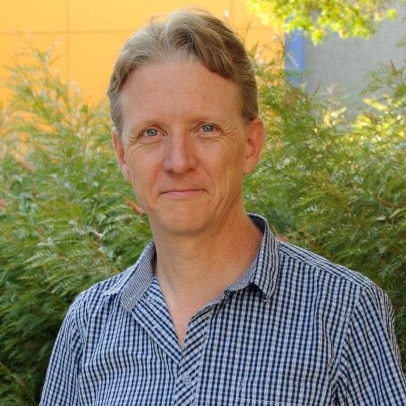
“But when we were told to move from the surf club to the beach, that’s when we knew it was serious.”
“You could see the fire over the hills … and hear the sounds of gas bottles exploding and houses going up (in flames).”
When Mark and his family returned to Banksia, they feared the worst.
Mark recalls picking through the ashes and giving water to some singed wildlife “just hoping they might survive.”
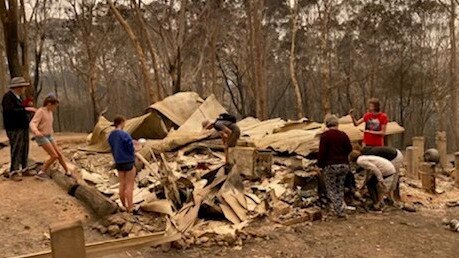
For a couple of months after the fires, Mark’s uncle, Trevor Gibson, visited the property to repair the fences and clean out the site.
“It’s forested, so most of the forest gums were strong enough to survive the fire,” Mark explained.
“What was lost was most of the undergrowth and the main concern following that is the weeds that will spring up and overtake everything else.”
Two years on and the Gibson are not sure whether they will rebuild Banksia.
The heroes of that horrific summer were the Rural Fire Service men and women who risked their lives to save others.
Graeme Skelton, Deputy Captain of the Malua Bay RFS, remembers it like yesterday.
When the fires hit Batemans Bay and the surrounding areas, including Rosedale and Malua Bay, he was out on the frontline
“There were four of us … the driver was 81, I was 67, and the two guys in the back were in their mid 50s,” he recalled.
“It’s very dangerous and fatiguing fighting fires, and the average age of an RFS member is about 60.
“Between those four people in that 24-hour period, we lost one house, two cars, and a shed.”
While those loses were substantial, they were nothing compared to what Graeme’s community faced – particularly those who lived on the rural edges of town.
“For about a year and a half, all you could see here were large bits of equipment and trucks, clearing sites that used to be houses and properties,” he recalled.
“Some of the people have moved because it’s still too raw and they don’t feel secure there … they couldn’t confront the level of terror there.”
He describes fighting those fires as being “worse than a bomb going off … (it was) all blowing up and gas bottles, houses and trees were exploding all around us.”
There were hundreds of vehicles parked between George Bass Drive and the beach where evacuees were sheltering.
“The wind was coming from the west, if the cars had caught fire the fumes would have been lethal,” he said.
“So we avoided a loss of life miraculously in this area – I’ve heard the estimate was we were going to lose people in this area but we didn’t lose one.
“It was just a stroke of luck that the wind came when it did and it didn’t come any earlier or later.”
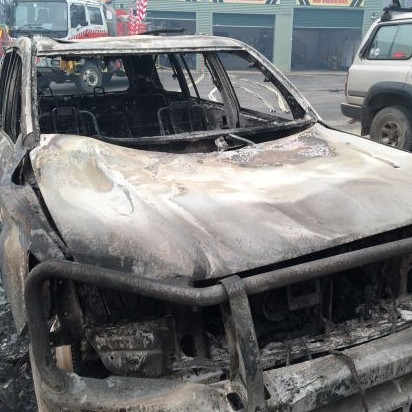
Despite the devastation, it’s been the resilience and strength of the local community that has really stayed with Graeme.
“The people here have been wholly resilient and have got on with it – it’s not the sort of place where you wait to get stuff done for you,” he said.
Over the past years, Graeme has seen the community come together to help clear the ground, provide supplies and rebuild houses.
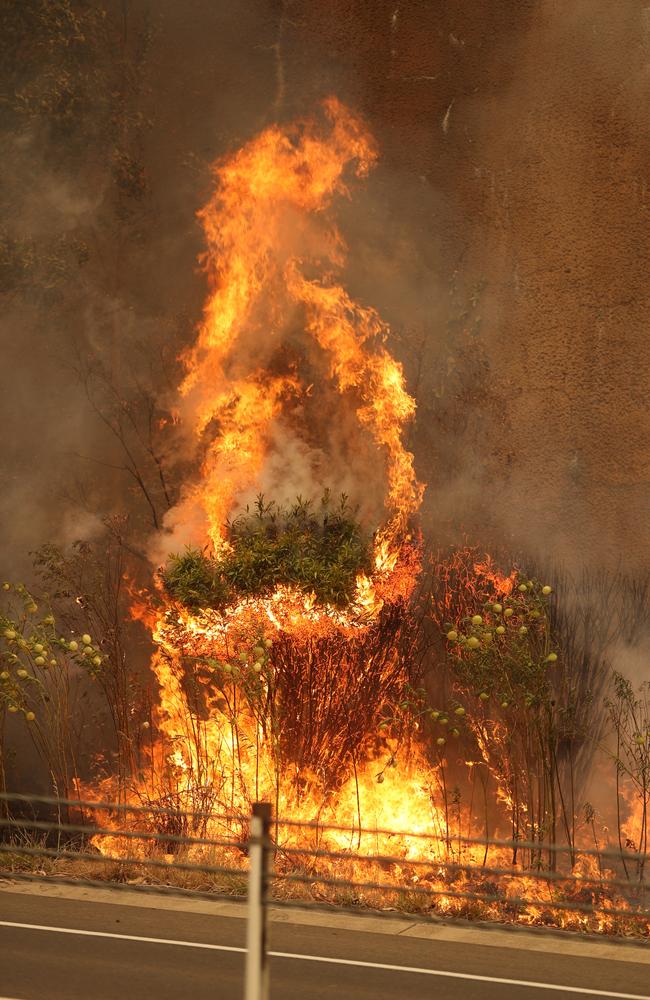
They’ve also cleared the area around the fire station and communications tower to help better protect them from future fires.
There was also a large influx of people signing up to become volunteer firefighters, 12 in Graeme’s brigade alone, including a large number of women.
“That’s something we really want and need because it’s important to have a culture and gender mix in the brigade – for development, renewal and succession,” he said.
In nearby Mogo, Jenny Bannan, Deputy Group Officer of the RFS Surf Beach brigade, was calling on all her 27 years of experience.
Along with another Deputy Group Officer and a Group Officer, she was responsible for the eight brigades north of Eurobodalla.
“It’s a bit of blur, as time goes on I’m remembering more about those days,” she said.
“It was very emotional because we knew we couldn’t save every house.”
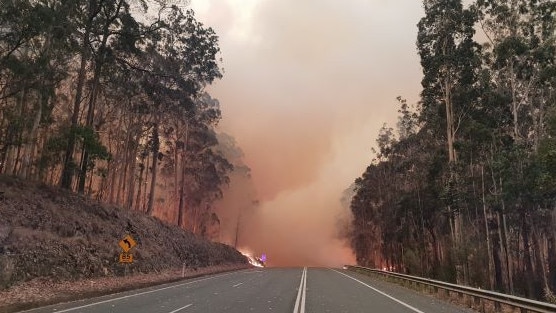
Since then, Jenny has been struck by how well the community rallied together to help each other out.
“But, when Covid came in, it made it all the more difficult for the small businesses here because people wanted to help out and spend their money but they couldn’t visit,” she admitted.
“And then, of course, we’ve just had really bad flooding in Mogo.”
The recovery process is still far from over, she explained.
“There’s still people living in caravans, two years on, which is quite amazing – at this point in time there shouldn’t be people still in that position.
“There’s been a lot of mental health support, which is really important, but we definitely need more financial help.”
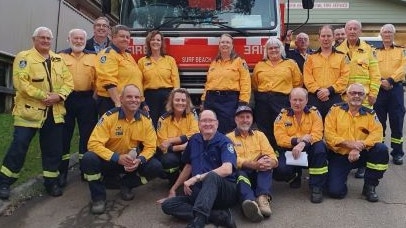
The fires claimed many small businesses and for those that survived it has been a battle ever since.
For 20 years Lorena Granados has run her small business, Roman Leather Goods, in Mogo.
Two years on from the devastation and she still isn’t back to normal.
“Since the fires, we got displaced from our business, from our home and there’s still that sense of being displaced,” she said.
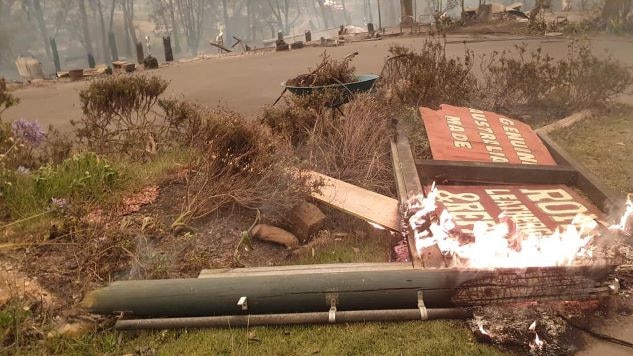
They haven’t managed to rebuild their old store yet and are still working out of a temporary building.
“It’s been two years now, but it only feels like the fires were three months ago because there’s been no end, no light at the end of the tunnel,” she said.
“Covid has been a nightmare and now there’s been rain and flooding here, so we’re going to lose all the business that comes with tourists arriving over summer.
“It just feels like we’re swimming against the current constantly.”
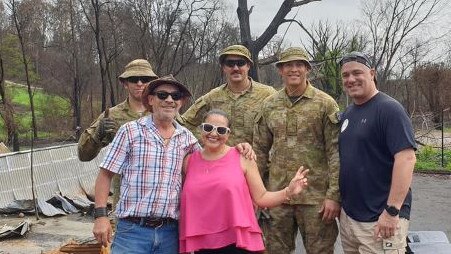
Navigating the bureaucratic process has been difficult for Lorena and she still hasn’t seen the impacts of the money that was promised by the government.
The business did not even have electricity until two months ago, when they put up a temporary post to keep their store running.
They still don’t have water connected.
“This business was something I loved doing, it was a passion, but now it feels like we’re just trying to keep employed – and we never had that feeling prior to the fires,” she said.
“We’re in survival mode still, it’s not living … everything has gone out of whack.
“But, in saying all that, we’re still going to continue, we’re going to persist.”
More Coverage
